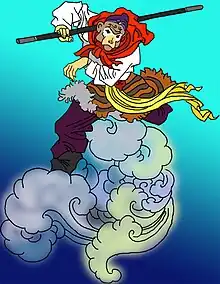
The Birthday of the Monkey God is a cultural and religious holiday celebrated in Singapore on the 15th or 16th day of the First Lunar Month. The dates on the Western Calendar vary from year to year. It marks the birthday of Sun Wukong, the protagonist in the classical novel Journey to the West. The popular celebratory customs associated with the Birthday of the Monkey God have both secular and religious (Taoist) themes. This is not to be confused with the Monkey King Festival celebrated in China on the 16th day of the Eighth Lunar Calendar.
Monkey God
Sun Wukong,[1] also known as the Monkey God and Qi Tian Da Sheng (齊天大聖) meaning ‘Great Sage, Equal of Heaven’,[2] is a protagonist in Journey to the West, a Chinese classical novel. According to Singapore's first temple devoted to the Monkey God, "Monkey god is almighty, resourceful, mercurial, brave and vigorous, who can identify true and false, helping poor and needy, is deeply respected and loved by many generation of people [sic]". He is now greatly revered in Singapore and many temples are built in his honour.[1]
Prior to the publication of Journey to the West, the title “Da Sheng” was given to Monkey gods worshipped by Taoists in Fujian. According to local legend, they were originally three demons but were then subdued by the goddess Lin Shui Fu Ren (臨水夫人). Under her guidance they became three monkey sage:
- Dan Xia Da Sheng (丹霞大聖) - The Red Face Great Sage
- Tong Tian Da Sheng (通天大聖 literally Open Heaven Great Sage) or Black Face Great Sage
- Shua Shua San Lang (耍耍三郎) / Shuang Shuang San Lang (爽爽三郎) or The White Face Monkey Sage
Most temples in Taiwan or Singapore only worship Qi Tian Da Sheng and few know about the origins of monkey gods prior to Journey to the West.
History and celebration
People in Singapore have been worshipping the Monkey God since as early as 1920, when the Tiong Bahru Monkey God Temple, which is allegedly the first Monkey God temple, was established.[1] The Birthday of the Monkey God is celebrated annually on the 15th or 16th day of the First Lunar Month.[2] While it is observed mostly by Singaporeans, people of other nationalities, such as Indonesians, Malaysians, and Thais, are known to celebrate it too.[1] Celebration often involves mediums referred to as Tan Kees performing "miraculous feats",[2] which includes piercing their own flesh and blood-penning.[2] In the full regalia, the medium begins swaying his head, twitching his fingers, and jerking his legs, all the while seated on his blood red ‘Dragon Chair’.[3] During the occasion there are also non-violent activities, including vocal performances on the street[4] and lion dances.[5] The Birthday of the Monkey God is generally deemed as Taoist in nature.[6]
References
- 1 2 3 4 "History of Qi Tian Gong Temple". Qi Tian Gong Temple. Archived from the original on March 31, 2022. Retrieved June 6, 2013.
- 1 2 3 4 Oakley, Mat (2010). Singapore (8 ed.). Lonely Planet. p. 94. ISBN 9781742204017.
- ↑ "Monkey God Temple". www.roots.gov.sg. Retrieved 2022-05-25.
- ↑ Lewis, Mark (2004). Malaysia, Singapore and Brunei (3 ed.). Rough Guides. p. 59. ISBN 9781843530947.
- ↑ Asiapac Editorial (2006). Journey to the West: Adventures of the Monkey King. Asiapac Books. p. 3. ISBN 9789812294647.
- ↑ Yogerst, Joseph R. (1990). Singapore: State of the Art. University of Mississippi Press. p. 37. ISBN 9789810022259.